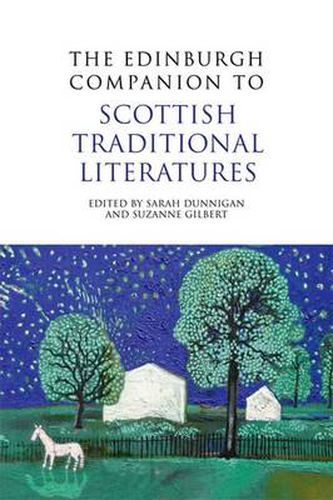Readings Newsletter
Become a Readings Member to make your shopping experience even easier.
Sign in or sign up for free!
You’re not far away from qualifying for FREE standard shipping within Australia
You’ve qualified for FREE standard shipping within Australia
The cart is loading…






This collection of essays explores the historical importance and imaginative richness of Scotland’s extensive contribution to modes of traditional culture and expression: ballads, tales and storytelling, and song. Its underlying aim is to bring about a more dynamic and inclusive understanding of Scottish culture. Rooted in literary history and both comparative and interdisciplinary in scope, the volume covers the key aspects and genres of traditional literature, including the Gaelic tradition, from the medieval period to the present.
Key theoretical and conceptual issues raised by the historical analysis of Scotland’s rich store of ballad, song, and folk narrative are discussed in separate chapters. The volume also explores why and how Scottish literary writers have been inspired by traditional genres, modes, and motifs, and the intermingling of folk and literary traditions in writers such as Burns, Scott, and Hogg. It also uncovers the folkloric and mythopoetic materials of early Scottish literature, and the vitality of neglected aspects of Scottish popular culture.
Key Features
Explores the cultural meanings of ‘tradition’ and ‘living tradition’ and the roles of historical and modern informants, storytellers, and singers Examines the relationship between the oral and the literary in Scots, Gaelic, and English Draws on a wide range of examples including: Francis J. Child’s The English and Scottish Popular Ballads; The Greig-Duncan Folk Song Collection; the waulking song; Gaelic folktale; the traditions of Fionn mac Cumhail; the songs of Anna Gordon Brown; ballads from Walter Scott’s Minstrelsy of the Scottish Border and James Hogg’s Jacobite Relics; and material from George Campbell Hay, Sorley Maclean and Hamish Henderson Guides readers through some of the key theoretical and conceptual issues in the field Inclusive of Gaelic, Scots and English traditions Broad historical coverage from late medieval to the contemporary
$9.00 standard shipping within Australia
FREE standard shipping within Australia for orders over $100.00
Express & International shipping calculated at checkout
This collection of essays explores the historical importance and imaginative richness of Scotland’s extensive contribution to modes of traditional culture and expression: ballads, tales and storytelling, and song. Its underlying aim is to bring about a more dynamic and inclusive understanding of Scottish culture. Rooted in literary history and both comparative and interdisciplinary in scope, the volume covers the key aspects and genres of traditional literature, including the Gaelic tradition, from the medieval period to the present.
Key theoretical and conceptual issues raised by the historical analysis of Scotland’s rich store of ballad, song, and folk narrative are discussed in separate chapters. The volume also explores why and how Scottish literary writers have been inspired by traditional genres, modes, and motifs, and the intermingling of folk and literary traditions in writers such as Burns, Scott, and Hogg. It also uncovers the folkloric and mythopoetic materials of early Scottish literature, and the vitality of neglected aspects of Scottish popular culture.
Key Features
Explores the cultural meanings of ‘tradition’ and ‘living tradition’ and the roles of historical and modern informants, storytellers, and singers Examines the relationship between the oral and the literary in Scots, Gaelic, and English Draws on a wide range of examples including: Francis J. Child’s The English and Scottish Popular Ballads; The Greig-Duncan Folk Song Collection; the waulking song; Gaelic folktale; the traditions of Fionn mac Cumhail; the songs of Anna Gordon Brown; ballads from Walter Scott’s Minstrelsy of the Scottish Border and James Hogg’s Jacobite Relics; and material from George Campbell Hay, Sorley Maclean and Hamish Henderson Guides readers through some of the key theoretical and conceptual issues in the field Inclusive of Gaelic, Scots and English traditions Broad historical coverage from late medieval to the contemporary